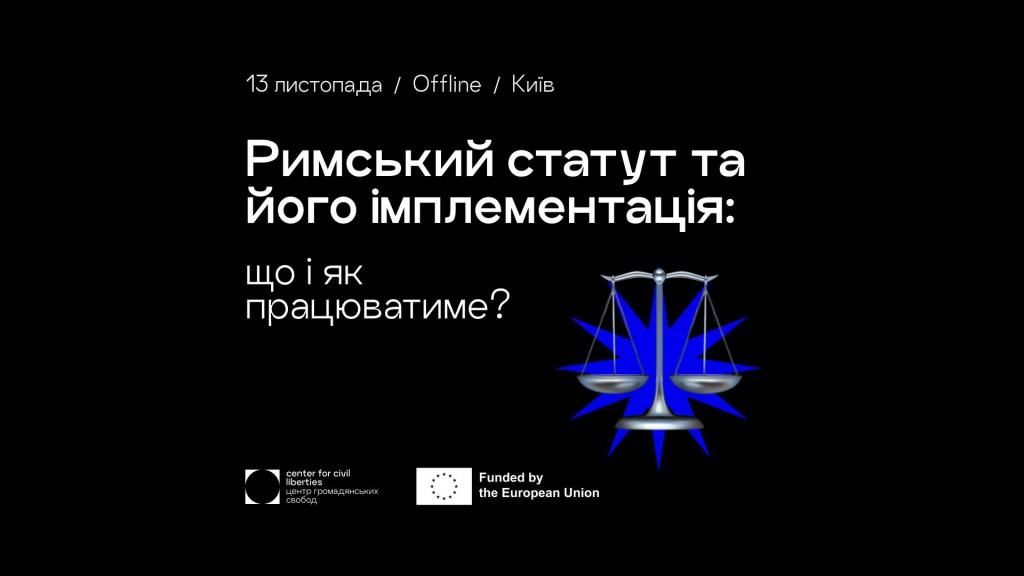Implementation of the Rome Statute entails the need to amend legislation
Ukrainian legislation must be harmonised with the standards of international law. Simply changing the titles of articles is not enough to bring them closer to the level of international justice. The provisions of the articles and the definitions of terms need to be elaborated and refined. This urgent need was discussed at the Roundtable of the Centre for Civil Liberties “The Rome Statute and its Implementation: What and How Will Work?”.

The roundtable was attended by human rights defenders, academics, judges and government officials.
On January 1, 2025, the ratification of the Rome Statute of the International Criminal Court by Ukraine will come into force. The ratification procedure itself took more than two decades, and all this time, Ukrainian human rights defenders have been demanding it from the authorities.
Ukraine approved the document in 2000, and only in 2024 the Verkhovna Rada managed to ratify it followed by it receiving the President’s signature.
At the Roundtable, Volodymyr Yavorskyi, Programme Director of the Centre for Civil Liberties, said: “It seems that we have ratified the Rome Statute. But still, we have not reached the goal. It is very important that we finally reach the point where everyone would say: “We already have the legislation we need, and now we can look into the practical aspects, into investigations, and deal exclusively with this.“
An implementation law has already been approved – a roadmap for adapting Ukrainian legislation to international standards (draft law No. 11484), while several other documents are under consideration by the Verkhovna Rada. The draft law on criminal liability for international crimes (draft law No. 11538) is also under consideration. It provides for changes to the procedure for investigating international crimes. Finally, there is one more document among the rest – draft law No. 2689, which is on the implementation of international and humanitarian law. It has been waiting for the president’s signature for more than three years.
The participants of the roundtable mentioned, among other things, the problem of insufficient detail in the definition of the concept of “war crime”, the inconsistency of the concepts of “crime of aggression” and “genocide” with international law, and the problem of the practical application of the definition of “crimes against humanity”. Discussions are underway on the concept of commanders’ responsibility for crimes committed by their subordinates in armed conflict. According to Mykola Khavroniuk, a Doctor of Law, unresolved issues can complicate the work of investigative bodies.
“What we have is a lack of investigative methods for investigators and prosecutors”, shared his opinion Mykola Khavroniuk, “because there is no confidence in their qualifications and, feeling a constant need to refer not only to the Rome Statute but also to dozens of other international treaties. Without being sure whether it is a war crime or a crime against humanity, investigating prosecutors cannot create appropriate methods for investigating the relevant crimes.“
Human rights defenders at the Roundtable noted that the current changes to harmonise Ukrainian legislation with international law are not enough and that the further process should be approached from a legal rather than a political point of view.
Onysiia Syniuk, Legal Analyst of the Human Rights Centre ZMINA, who followed the roundtable, noted: “It was immediately clear from the text of the implementing law that it was a political compromise aimed at not slowing down the ratification of the Rome Statute, rather than at fully harmonising Ukrainian legislation with international law in terms of liability for international crimes, in particular the Rome Statute. This work is still ahead. In particular, the articles on the crime of aggression and war crimes have changed their titles, but have not become closer to international standards in terms of content. Numerous questions also arise in the context of the balance between the need for harmonisation and the practical consequences for investigations – the definition of “genocide” has already been amended with an additional qualification to “public calls for genocide”, namely that they must also be “direct”. How will this affect the cases of this crime in which a verdict has already been passed? Another open question is the application of the article on “crimes against humanity” retroactively. The standard approach is that the article should be applied from the moment of its adoption and should not be retroactive. However, the nature of crimes against humanity requires proof of scale and systematic nature, and the loss of the period from 2014 until their introduction into Ukrainian legislation to assess certain violations will significantly affect the possibility of proving this category of crimes. These and other issues require further discussion and amendments to Ukrainian legislation based on a legal rather than political approach.“
If you have found a spelling error, please, notify us by selecting that text and pressing Ctrl+Enter.















